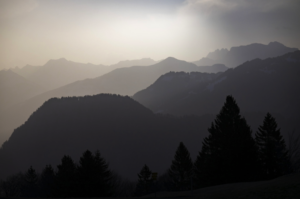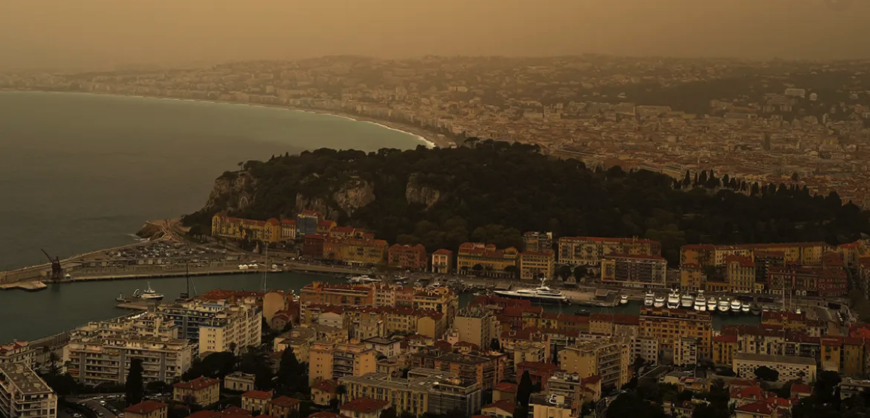A huge amount of sand from the Sahara has covered the Swiss sky since Friday, dramatically reducing visibility and giving a yellowish tint to daylight in much of the country.
“The arrival of sand from the Sahara leads to a very clear reduction in sunshine and visibility. There is also an increase in fine particle concentrations,” underlines the Swiss meteorological service MétéoSwiss in a message on X.
As the sand concentrates below 3000 metres, air quality has deteriorated in particular, from the shores of Lake Geneva to the rest of the country.
AirCHeck, the app launched by the cantons to provide real-time data on air quality in Switzerland, reports that air pollution is high in a radius from the southwest to the northeast of the country.
That dust reached about 180,000 tonnes, according to the calculation models used, meteorologist Roman Broli of SRF Meteo told public radio.
Already on Friday, a strong southerly wind had carried Saharan sand from northern Africa to Switzerland.
The Sahara is the largest source of mineral dust, releasing between 60 and 200 million tonnes a year, and while the larger particles fall quickly to the ground, smaller ones can be transported thousands of kilometres and reach all over Europe.
As it settles, this sand gives an orange tint to the snow.
See photos from Switzerland


Alarm in France too
Les quantités de #sable du Sahara en suspension sont toujours très importantes ce samedi matin, notamment dans le Sud-Est du pays.
Dans les #Alpes, le ciel se maintient dans une teinte très ocre voire orangée, comme en témoigne les différentes webcam @skaping pic.twitter.com/qIwyZE9isk
— Guillaume Séchet (@Meteovilles) March 30, 2024
Southeastern France is also on alert due to the Saharan sand and concentrations of fine particles
The alert process was activated on Friday in Corsica, and is expected to continue throughout the weekend as scientists say the sand cloud will remain.
Le sud-est de la France en alerte pollution aux particules fines, en raison d’un nuage de sable du Sahara https://t.co/USqc7cEPa2
— Le Monde (@lemondefr) March 30, 2024
French authorities announced today that the alert threshold was exceeded on Saturday across the entire Provence region. African dust has blanketed areas of southeastern France, from the Côte d’Azur to Lyon. BFMTV, in a report, posted user tweets capturing the eerie landscape created by the African dust.
Easter in Greece: 6 destinations for your travel list (photos)
A new wave of dust in Greece
In his post, Klearchos Marousakis said that in the coming hours there is expected to be a second wave of African dust in Greece, but it will be milder than the first one:
“The first wave of African dust is bidding us farewell and we are preparing to welcome the second wave which seems somewhat milder, unless it regrets it in the process and intensifies. See the simulation from our weather model. “Spring has come to us in a wild mood…” he said in his post.
According to the National Meteorological Service, the weather conditions that will prevail on Sunday, Monday and Tuesday in our country will favour the transport of African dust.

































